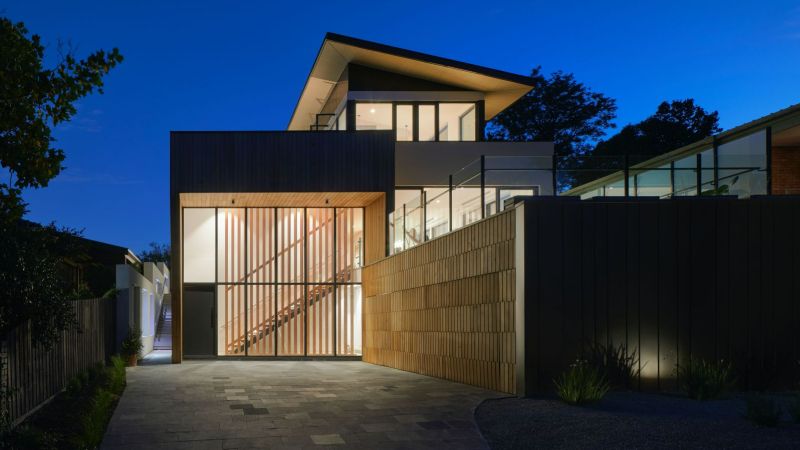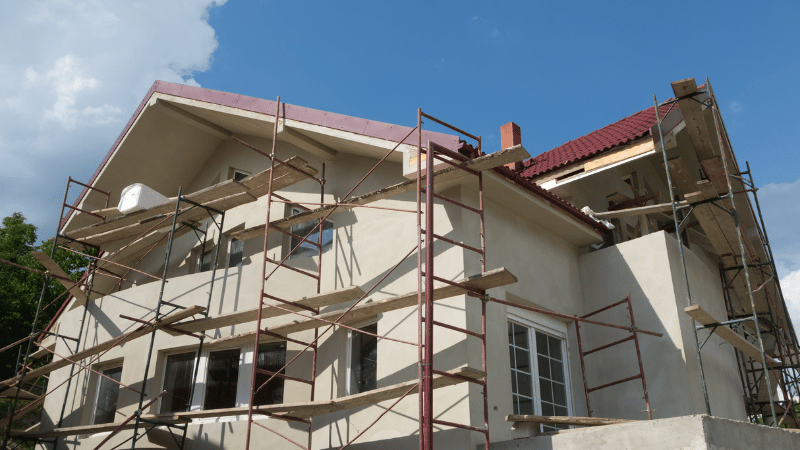Categories
How Does Property Development Finance Work?

Property development can be a lucrative venture, but it often requires substantial financial backing. Property development finance plays a crucial role in supporting developers looking to embark on construction or heavy refurbishment projects.
It’s a sobering truth that the success of a build project is often less dependent on the availability of a development site, innovative design or high-quality workmanship than on the availability of affordable and flexible finance.
Get Development Finance Quotes »
Development projects require a bespoke and niche form of finance that many lenders don't provide, and securing a suitable loan that's flexible to your needs as a borrower can have its challenges. Funds must be swiftly available when required, but not sitting unused in the bank accumulating interest charges before materials need to be purchased or wages paid.
In this guide, we'll cover the fundamentals of development finance, what it's used for, and how to get it.
Key Takeaways
- Development finance is a short-term loan designed to help fund property development projects, covering purchase and build costs.
- Loans terms are typically up to 18 months.
- They're usually repaid through property sales, mortgage refinancing, or staged unit sales in multi-unit developments.
- A knowledgeable broker can help you secure timely and cost-effective solutions tailored to your project’s needs.
In This Guide:
What are the Key Features of Development Funding?
What are the Main Uses of Development Finance?
Finance to Develop an Existing Property
Finance for Ground-up Development Projects
Development Finance Calculator
Finance for Knock-down and Rebuild Development Projects
Example of Development Funding Drawdown Tranches
How Does the Repayment of Development Finance Work?
How Much Can I Borrow Through Development Funding?
What if I'm an Inexperienced Developer?
Pitfalls to Avoid in Development Finance
Using a Specialist Mortgage Broker for Development Finance
What is Property Development Finance?
Development finance is a short-term loan, usually extended for up to 18 months, to help developers with the purchase and build costs of a development project.
You can get a development loan for residential, commercial and mixed-use projects, including ground up new builds, knock down and rebuild projects, and conversions and refurbishments.
The scale of a project can range from a single build to multiple units on a site.
To make sure you get the most favourable terms, you can compare development finance rates from different lenders. A specialist finance broker will have the best knowledge of lending options and will have relationships with private lenders who you may not otherwise have access to.
Learn more about Property Development Finance in our short video below:
Get Development Finance Quotes »
What Are the Key Features of Development Funding?
- Loans from £200K
- Short-term finance solution
- Rolled-up interest (more on this later)
- Staged drawdown (to facilitate the progression of a build project)
These are complex funding arrangements to set up and administrate, and most development finance lenders are unwilling to consider borrowing requirements of less than £200K.
At Clifton Private Finance, we can use our market expertise to find the best option for you.
What is Rolled-up Interest?
Lenders will usually want to see the interest payable on your loan rolled up into the total loan amount and repaid at the end of your term.
The most advantageous feature of development finance is that funds are made available as and when they are needed – so clients don’t pay interest on finance that hasn’t yet been drawn down.
What is Staged Drawdown?
Staged drawdown on a development loan means you can draw out chunks of your loan as and when they're needed for your project.
You'll only be charged interest on what you have drawn from your loan, so for the majority of your project, you won't be paying interest on the full amount that you've agreed to borrow - only what you've drawn and actually spent so far.

What Are the Main Uses of Development Finance?
Here are the three main uses of development finance - we go into more detail for each one later on:
See similar: Airspace Development Loans & London Airspace Development
Finance to Develop an Existing Property
If you already own your property, there are a few ways of raising finance for your development plans.
Renovation or refurbishment loans are often used for light or heavy refurbishments on a property you already own.
Light refurbishments could range from basic decorating to a new kitchen or heating system but don’t generally require any planning permission or regulatory approval.
Heavy refurbishments will likely be significant structural alterations, property extensions or conversions that will require planning permission.

Second Charge Loans
If you already have a mortgage on your property, you may want to consider taking out a second charge mortgage to raise the additional finance you need.
A second charge mortgage allows you to leverage the capital you have accumulated in your property through your existing mortgage to get further finance. You'll have two mortgages to pay off, but it could save you from paying early repayment charges (ERCs) on your existing mortgage or losing a great interest rate that you're currently paying if you were to remortgage entirely.
Finance for Ground-up Development Projects
Securing ground up development finance is a more complex and time-consuming process, and you'll need to have your plans clearly laid out so you can draw down chunks of your loan at the right times throughout your project.
An independent surveyor will need to agree to this schedule and work with you throughout your loan term.
The Role of an Independent Monitoring Surveyor (IMS)
Your progressive drawdown of funds needs to be agreed upon in the loan schedule for your project, and an IMS appointed by your lender (but paid for by you) will make site inspections at each stage to confirm that progress is on schedule before your next tranche of funds is released.
The IMS acts as the lender’s "eyes and ears" on the project and will flag up any potential issues to them.
It’s in both your and your lender’s interest that your project proceeds on schedule, but funding delays can arise if busy developers don’t schedule site inspections with sufficient notice.
Development Finance Calculator
To get a better understanding of how much your development project will cost you, use our property development finance calculator below:
Finance for Knock-down and Rebuild Development Projects
If the majority of your property's value is in its location compared to the building itself, then a knock-down rebuild project could significantly increase the value of your asset.
Demolishing an old, dilapidated building and replacing it with a modern construction with all the fixtures is expensive. However, when you combine a pristine, brand new home with an excellent property location, the realised value can far outweigh the costs.
Many lenders aren't too keen on the idea of you knocking down a house and re-building, though, due to the additional complexities.
For example, if you haven't done your calculations properly, your new property might not make enough profit to cover the interest built up on your loan. Not to mention the endless amounts of uncontrollable outside variables, from the weather to the availability of building materials or contractors.
That being said, even if you're not an experienced developer, there are lenders that specialise in this type of development finance and will strive to see the potential in your project and offer you finance. A specialist mortgage broker can connect you to the right development lenders for your project.
Get Development Finance Quotes »
Example of Development Funding Drawdown Tranches
- First-time developer
- 6-bed, 6-bathroom luxury SW London residence
- Knock-down and rebuild
How Does the Repayment of Development Finance Work?
Your exit strategy for a development loan is agreed at the outset, and repayment is funded either by:
- The sale of the property
- Mortgage finance
On multi-unit projects, developers commonly use the proceeds from the sale of the first units to part-fund the expensive final stages of later units (such as fitting bathrooms and kitchens and completing any landscaping works).
They'll then take their profit from selling the final unit(s).
Professional developers, on the other hand, want to get their next project underway as soon as possible and will need finance to purchase their next development site and progress through the planning process.
To access funds before final sales on your previous project are completed, you may want to make use of development exit finance.
An experienced broker considers all the circumstances of your project, as well as the extent of your development management experience.
At Clifton Private Finance, we have relationships with specialist lenders who can take a flexible approach to your project and offer you finance solutions tailored to your needs.
How Much Can I Borrow Through Development Funding?
The amount of funding you'll have access to will be determined by a lender’s valuation report.
A lender's valuation report determines:
- The current value: the value of the site with planning permission or the value of the property before refurbishment
- Build costs
- Gross development value (GDV): the market value of the completed property or properties when all works are complete
Each lender will have its own lending parameters determining the maximum amount they’re willing to lend.
A low LTV (50-60%) buys cheaper development finance, and very few lenders are willing to lend above 70% LTV on development projects.

What if I'm an Inexperienced Developer?
It is more difficult to get development finance with no little to no experience, but there are options out there.
Here are some top tips to improve your chances of getting a development loan without experience:
- Have a strong team behind you: an experienced architect, builder and project manager who can each demonstrate a history of realistic costings
- Experience from your own work that may be relatable, for example as an architect or project manager
- Sub-50% loan to value (possible if the site is already owned, with planning permission)
- Getting a fixed-price contract with your builders
- Most lenders will include step-in rights on finance contracts with first-time / less experienced developers
Pitfalls to Avoid in Development Finance
Here are some of the most common issues we see throughout development projects:
- Quantity surveyors being unfamiliar with modular components and building methods
- Developers changing their plans mid-project and incurring extra costs
- Hold-ups on the delivery of materials causing significant delays
- Site managers not giving enough notice for IMS site inspections
An Experienced Mortgage Broker is Essential
At Clifton Private Finance, we have a network of successful developer clients for whom we’ve sourced reliable, affordable and flexible finance on development projects ranging from £200K to £10M.
We work with experienced industry players through to first-time developers: we will look at all the parameters of your project and advise on the most timely and cost-effective funding sources.










